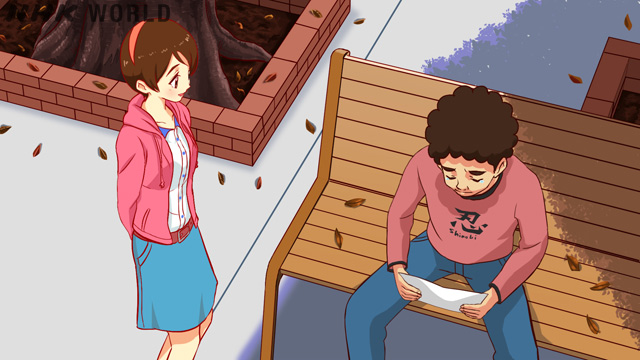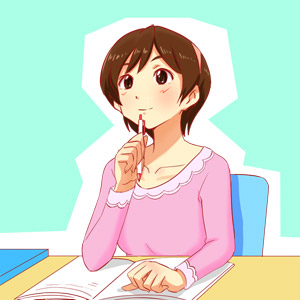Lesson 26
Let's do our best next time.

Today, Anna got the results of her Japanese-test back. She found her classmate Rodrigo bowing his head low.
Key phrase:
TSUGI WA GANBARÔ
Scripts
| アンナ | ロドリゴ、元気がないね。 | Rodrigo, you are not in high spirits.
|
|---|---|---|
| Anna | RODORIGO, GENKI GA NAI NE.
Rodrigo, you are not in high spirits.
|
|
| ロドリゴ | 試験ができなかったんです。 | I couldn't do well on the quiz.
|
| Rodrigo | SHIKEN GA DEKINAKATTA N DESU.
I couldn't do well on the quiz.
|
|
| アンナ | 私も…。60点でした。 次はがんばろう。 |
Me, neither.... I got a 60. Let's do our best next time. |
| Anna | WATASHI MO.... ROKUJITTEN DESHITA. TSUGI WA GANBARÔ. Me, neither.... I got a 60. Let's do our best next time.
|
Grammar tips
N DESU
 You say N DESU when you explain a situation or a reason. Before N DESU, you must use the plain form of verbs, such as the dictionary form and the TA-form.
You say N DESU when you explain a situation or a reason. Before N DESU, you must use the plain form of verbs, such as the dictionary form and the TA-form.
e.g.) SHIKEN GA DEKINAKATTA N DESU.
(I couldn’t do well on the quiz.)
DESHITA
 DESHITA is the past form of DESU.
DESHITA is the past form of DESU.
e.g.) TAIHEN DESU. (It's hard.)
>> TAIHEN DESHITA. (It was hard.)
Teach Us, Teacher
Volitional form of verbs
GANBARÔ (Let's do our best, or I'll do my best), is a conjugating form of a verb known as "the volitional form." It expresses the will of the speaker. We also use it to invite the listener to do something together, or to urge the listener to do something. We wouldn't use this expression to our superiors. Let me explain how we make the volitional form from the MASU-form of verbs.
Sound Words
Crying
Japanese is a language with lots of onomatopoeia. A wide range of onomatopoeia in the Japanese language, from noises made by animals to expressions of feelings, is explained by audio.
Anna's Tweets
Rodrigo got an 80 in the test which is a lot better than I did. I didn’t have to worry about him.

